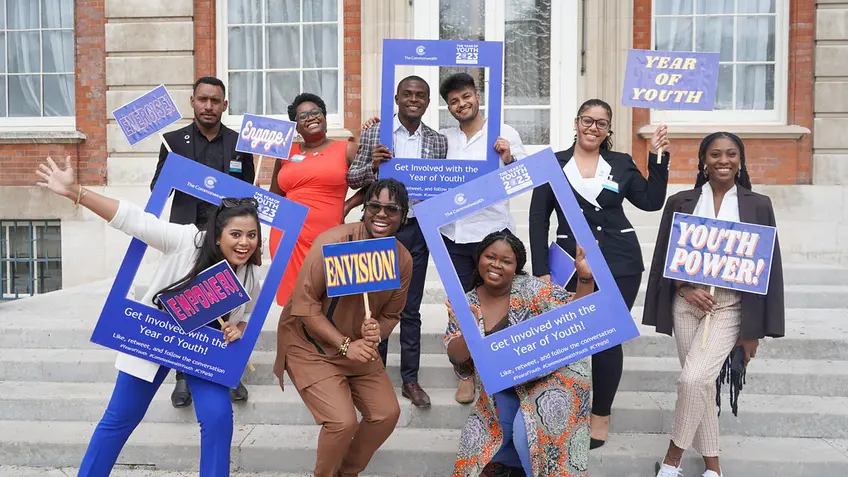Information, Capacity and Inclusivity: Reshaping Youth Engagement in NDCs
Photo courtesy of the Commonwealth Secretariat
Youth participation in decision making is crucial for building a sustainable and inclusive future. By meaningfully involving young people, governments can ensure that immediate climate policies also align with the needs of our next generation.
While considerable progress has been made in empowering and involving youth, significant work is still needed to reflect these inputs in NDCs and their implementation plans. Based on insights from UNICEF, only 24% of new or updated NDCs meet all criteria for child-sensitivity and only 31% of those analyzed referenced the engagement of young people in the development process. A new insight brief, produced by the NDC Partnership Support Unit and informed by the UNFCCC’s synthesis report on long-term low-emission development strategies (LT-LEDS), outlines trends concerning gender and youth considerations within the LT-LEDS planning and implementation process. These considerations and policies are poised to profoundly influence the future of young people.
The NDC Partnership is dedicated to addressing this gap through direct and indirect support across our membership. Our third annual Youth Engagement Forum (YEF) in 2023 highlighted opportunities and lessons learned in strengthening youth engagement across the Partnership's work. Insights and outcomes from the annual YEF are used to inform implementation of the Partnership’s Youth Engagement Plan (YEP), which seeks to better incorporate youth needs and engagement opportunities into NDC implementation efforts around the world.
The NDC Partnership’s latest webinar, Youth Engagement in NDCs, co-hosted with the UNDP under the Raising Ambition Through Partnership series, highlighted some of the important steps that countries and partners are already taking to increase youth engagement in NDC processes at this critical juncture. “A new NDC cycle is around the corner, and the first Global Stocktake is out; this is a wonderful opportunity to reshape the quality of youth engagement at the national level when it comes to climate policymaking”, noted panelist Vladislav Kaim, NDC and Youth expert.
Accurate and up-to-date information is crucial for determining key gaps and challenges for formulating next steps and mechanisms of assistance moving forward. Members of the Partnership are working to capture qualitative and quantitative data to better inform the global NDC process.
On Equal Terms is a new checklist published by UNDP, offering officials and policymakers a guide for youth inclusive NDC processes. Developed through extensive engagement with climate stakeholders and youth organizations globally, it integrates insights from 335 youths across 78 countries. This adaptable tool spans six crucial stages of NDC processes, from initial engagement to implementation, incorporating youth perspectives at all levels.
With a goal of increasing child sensitive climate policies, inclusive of all children’s and young people’s rights, participation and role as stakeholders and drivers of change, UNICEF has created the NDCs for Every Child Data Platform. The platform’s data provides context to determine the child-sensitivity of NDCs submitted after September 2019. The findings are presented and visualized on the platform’s global dashboard through country profiles and an interactive map, including guiding advice supplied for governments, youth, civil society and donors looking to use the data to inform their planning.
The Commonwealth Secretariat and the Deutsche Gesellschaft für Internationale Zusammenarbeit GmbH (GIZ) are two members of the Partnership actively involving youth in national and global climate action. Through initiatives like the Commonwealth Youth Climate Network and the Commonwealth Youth Statement on Climate Change, the Commonwealth Secretariat is ensuring direct youth involvement in climate discourse and decision-making processes. They advocate for youth representation in national delegations at high-level climate negotiations, aiming for inclusive and effective climate policies.
GIZ has been actively involved in shaping in-country NDC processes. In collaboration with Kenya's Ministry of Environment, Climate Change, and Forestry, GIZ facilitated consultations with youth from all 47 counties to shape Kenya's National Climate Change Action Plan (NCCAP), resulting in a dedicated chapter outlining priority actions for youth empowerment in climate action.
In Zimbabwe, where approximately 67% of the population is under 35, youth are integral to driving developmental activities. The country conducted nationwide consultations to gather youth input on NDC priorities, leading to the development of a national NDC youth position paper endorsed by the Minister of Environment. This process has facilitated collaboration between the government and youth in climate action efforts. Notably, youth are assuming leadership roles in the NDC implementation process, representing Zimbabwe on international platforms such as COP28, demonstrating their involvement across the planning processes.
Youth voices are increasingly vocal about the importance of moving away from tokenistic gestures and embracing meaningful youth engagement in all stages of the NDC process. “Young people are often seen as passive stakeholders or even beneficiaries in the NDC's processes. This is a very big misconception that we must address,” remarked webinar panelist Amanullah Porag, from the NDC Working Group at YOUNGO.
This view mirrors those of others advocating for active involvement in decision-making processes related to NDCs. Porag outlines three crucial elements for ensuring meaningful youth engagement:
- Young people must be well-informed about the NDC processes from the beginning.
- Capacity-building and support are essential for youth to effectively contribute their opinions and implement projects aligned with NDC goals.
- Inclusivity is key, and stronger efforts should be made to involve young people from diverse socio-economic backgrounds and geographical locations.
Greater youth engagement in the NDC process will ensure more inclusive whole-of-society stakeholder engagement and is crucial for long-term climate and development planning. The NDC Partnership is committed to building enhanced and sustained youth involvement in climate policies and actions moving forward.
This year's 2024 Youth Engagement Forum will take place over multiple sessions throughout the year. Sign up for our newsletter to find out more, or directly engage with youth-related resources on our online Knowledge Portal.
